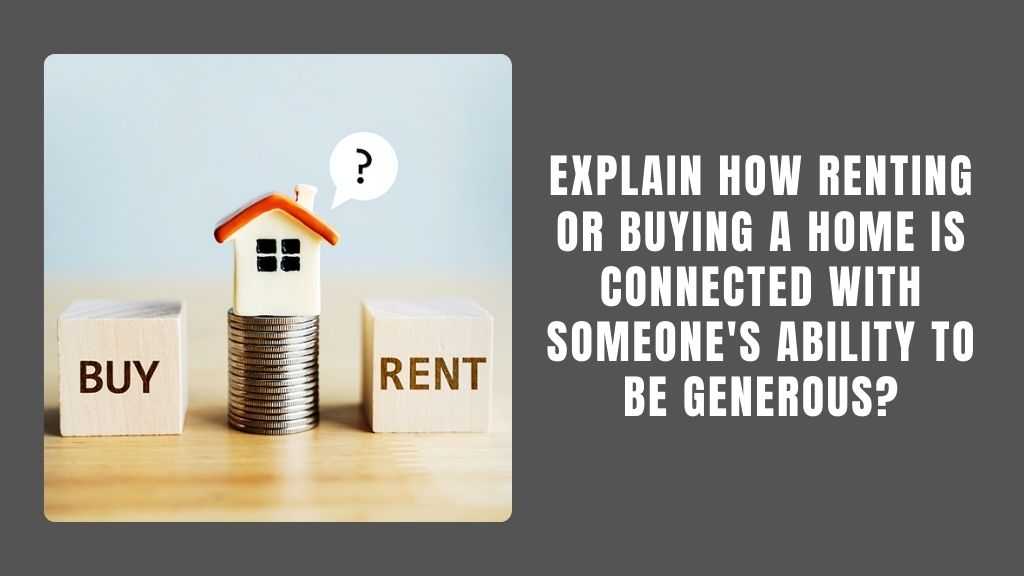Many people think about whether they should rent or buy a home. But have you ever thought about how this decision can affect your behavior or actions toward others? In this blog, we will explain how renting or buying a home is connected with someone’s ability to be generous. The place where a person lives and how stable they feel can directly affect how kind and giving they are. People who feel secure in their living conditions often feel more confident to help others. On the other hand, those with financial stress or housing worries may find it harder to focus on being generous.
Let us now explain how renting or buying a home is connected with someone’s ability to be generous in simple words.
What Is Generosity?
Generosity means being kind, helpful, and willing to give to others without expecting anything in return. A generous person shares their time, money, or resources. This can be as small as helping a neighbor or as big as giving to charity. Generosity is not always about money. Sometimes, just being there for someone or offering support is also a kind act. Generous people care about others and want to make their lives better.
Also read: What Type of Interest Rate is Locked in and Won’t Change for the Life of the Loan?
Renting a Home: What It Means
Renting a home means you are living in a house or apartment that someone else owns. You pay rent every month to live there. This home is not your property, and usually, you have to follow some rules set by the landlord. Renting can be a good choice for people who move often, have less savings, or do not want to take a loan. But renting can also bring stress. The rent may go up anytime, and you may be asked to leave the house if the owner wants to sell it.
Buying a Home: What It Means
Buying a home means you own the property. You pay a big amount at once or take a loan and pay slowly every month. This is called a mortgage. Buying a home gives you stability. You can make changes to the house, decorate it as you wish, and feel more settled. But it also comes with big responsibilities. You have to pay for repairs, property tax, and loans. Owning a home is often seen as a big achievement, especially in many cultures.
Also read: What Are at Least Two Ways Credit Card Companies Make Money?
How Renting or Buying a Home is Connected With Someone’s Ability to Be Generous?
How Renting Affects Generosity
People who rent homes may face certain challenges that can affect their ability to be generous. Here are a few reasons:
a. Financial Uncertainty
Renters often face uncertainty. Rent may increase, or the owner may not renew the contract. Because of this, many renters try to save money for future emergencies. They may feel they cannot give money to others or donate regularly.
b. Less Emotional Security
When people do not feel settled, they focus more on their own life. A person moving from one house to another may not feel like part of a community. This can make it harder to feel connected to others and give support.
c. Living Paycheck to Paycheck
Renters, especially those with low incomes, often spend most of their earnings on rent. If they are left with little money, they may not have extra to help others, even if they want to.
Also read: Who Do You Contact if You Have Questions About Repayment Plans?
How Buying Affects Generosity
Owning a home can increase a person’s ability to be generous in many ways:
a. Feeling Secure
When a person owns a home, they feel more settled. They know they won’t be asked to leave suddenly. This stability gives peace of mind, which can lead to a more generous mindset.
b. Long-Term Thinking
Homeowners often think about the future. They may want to make their neighborhood better. This can lead to giving more time and help to the local community or charities.
c. Better Financial Planning
Even though buying a home is expensive, many homeowners plan their money better. They know their fixed loan payment and can budget around it. This makes it easier for them to set aside money to help others.
Also read: What Document Explains Your Rights and Responsibilities as a Federal Student Loan Borrower?
Generosity Is Not Just About Money
It is important to remember that generosity is not only about giving money. It is also about offering help, spending time, and showing kindness. Sometimes, renters may not give money, but they help neighbors, volunteer at schools, or care for someone sick. These are all forms of generosity.
Renting or Buying: Which Encourages More Generosity?
There is no fixed answer. Both renters and homeowners can be generous. But studies show that homeowners, on average, give more to charity and participate more in community work. This is often because they feel more settled and secure. Still, many renters are also very kind and helpful, especially in places where housing costs are lower and renters feel safe.
Mental Peace and Generosity
A person who feels mentally relaxed is more likely to help others. Renting or buying can affect this. If someone is worried about rent or house loans all the time, their mind is busy with stress. But when a person feels calm and safe, they have more space in their mind to think about others. This is why stable housing, whether rented or owned, is important for kindness and giving.
Community and Connection
People who stay longer in one place often feel more connected to their neighbors. They start caring about the people around them. This is common with homeowners but can also happen with renters who stay in the same house for many years. Feeling part of a community increases generosity. People start sharing food, helping during hard times, and supporting local causes.
Also read: Who Should You Contact if You Have Trouble Making Payments Once You Leave School?
Cultural and Social Impact
In some cultures, owning a home is linked with respect and pride. People feel they have “made it.” This confidence can lead them to give back to society. They may support schools, religious places, or social groups. On the other hand, in places where renting is common and stable, renters may also feel free to be generous. So, social views and culture also play a big role.
Generosity in Young People
Young people today often prefer renting because homes are expensive. Many of them still show kindness in different ways. They help friends, donate online, or volunteer. As long as they have some form of stability, even rented, they are able to be generous.
The Role of Government and Society
Governments and society can help people become more generous by making housing more stable. If renters get strong rights and do not fear being removed quickly, they can feel safe. If home loans are made easier and fair, more people can own homes and feel secure. With less housing stress, more people can afford to care about others and give support.
Also read: Who Do You Contact if You’ve Already Accepted More Loan Money Than You Need?
Tips to Stay Generous No Matter Your Housing
Whether you rent or buy, here are some simple ways to stay generous:
- Budget for giving – Even a small amount helps.
- Give time – Volunteer or help a neighbor.
- Share skills – Teach someone something useful.
- Join community work – Be active where you live.
- Show kindness – Even small acts make a difference.
Also read: How Do Loan Terms Affect the Cost of Credit?
Conclusion
Now that we have explained how renting or buying a home is connected with someone’s ability to be generous, we can understand how housing impacts not just our personal life but also our behavior towards others. A stable living condition, whether rented or owned, gives people the freedom to think beyond their needs. It helps them focus on helping others, supporting good causes, and building better communities.
While homeowners may have more financial room and feel more secure, renters can also be generous in many other ways. The most important thing is having peace of mind and a heart willing to give.

